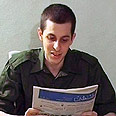
Three years in captivity. Gilad Shalit
Photo: Reuters
Cadets at the Bnei David Religious Military Academy sent Prime Minister Benjamin Netanyahu and Defense Minister Ehud Barak a letter expressing their concern over a mass release of Palestinian prisoners in exchange for kidnapped IDF soldier Gilad Shalit's safe return.
Any decision regarding a prisoner exchange deal, said the letter, must be based on something besides the desire to see him home again.
Shalit Deal
Aviad Glickman
Judges reject petition filed by terror victims' relatives calling for publication of list of Palestinian prisoners slated for release in Shalit deal, say 'we were convinced security concerns behind secrecy'
"As painful as it may be, we believe the State cannot give in to terrorists and bow down to their will as a result of emotional blackmail."
The cadets admit that they do not know the actual details of the imminent deal, but say that "reports of the deal make it clear that the enemy is demanding a price which may compromise our resilience before those who wish us ill."
Daniel Cohen, one of the cadets who signed the letter, told Ynet that it was the result of the academy's students "hearing and seeing media reports about the impending deal. We thought the terms reported were inconceivable and decided to take a stand. Only five cadets out of 200 were not in agreement on the issue."
Cohen stressed that the letter does not mean the cadets oppose the deal: "We are not trying to work against it. We feel for the Shalits and we pray every day that (Gilad) comes back safe and sound. Still, this outline is just too much."
'We have faith in government'
Bnei David cadets were not the only ones to voice their opinion – their peers at the Upper Galilee Military Academy, which is a secular institution, also sent a position paper to the prime minister.
"As Israeli citizens who will don uniforms within a year, we feel that Israel is committed to see Gilad Shalit and any other missing or captive (soldier) returned – but not at any price.
"We fear that the current deal will simply invite more abductions and acts of terror against civilians," said the paper.
A letter by the cadets at the Otzem Military Torah Academy echoed the sentiment, saying that their faith in Israel's government and military "does not depend on the release of captive soldiers at any price, nor will it deter us from the immense and important duty of serving in the IDF."
The cadets wrote that they were "shocked to learn of Israel's intention to release arch-terrorists and murderers, who will no doubt endanger society in the future.
"We trust decision makers will consider the bigger picture of what is best for Israel's security, and that they will make the right, albeit possibly painful, decision."
A letter sent by students at the Israeli Academy for Leadership voice similar concerns, but stressed that "(the government) must resist the emotional aspects, since emotion may sometimes be of disservice… Nevertheless, no matter what the final decision is, we will stand by it as the loyal citizens that we are."
Hanan Greenberg contributed to this report















